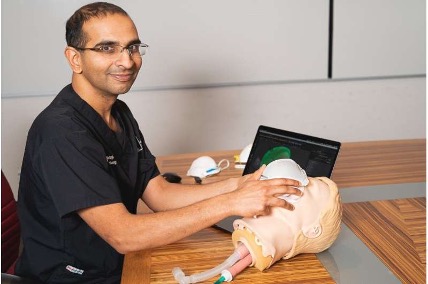3D frame helps the mask fit
July 6, 2023
Source: drugdu
 264
264

If the face mask fits, it's much safer—say Flinders University medical experts after developing a low-cost way to customize N95 filtering facepiece respirators (FFRs) for health workers on the front line of the pandemic and respiratory viruses such as influenza.
Researchers say the decrease in "leakage" and greater comfort for the wearer whose face has been personally fitted could also have applications to improving respirator and mask safety in a wide range of industrial settings in health care and beyond. The article, "Personalized 3D-printed frames to reduce leak from N95 filtering facepiece respirators: a prospective crossover trial in health care workers" has been published in the Journal of Occupational and Environmental Hygiene.
"Individually and anatomically personalized 3D-printed face frames represent a rapidly scalable technology to significantly improve health care worker protection and comfort, and fit-testing pass rates," says Flinders University cardiology research fellow Darius Chapman.
Working with public hospital workers during the COVID-19 pandemic, Mr. Chapman with clinician and cardiac electrophysiology scientist at Flinders, Professor Anand Ganesan, led the project to compare the performance of personalized 3D printed frames to improve N95 FFRs test scores compared to regular respirators.
They used a mobile iPhone camera and an app to produce 3D scans of volunteers' faces which were then imported into a software program to define each user's facial structure and features to scale.
A plastic and then silicone-coated frame was then made with a commercially available 3D printer from these individual facial impressions, or virtual scaffolds.
"Overall, the quantitative fit testing significantly improved, as did the respirator comfort and tolerability factor," says Mr. Chapman.
"With further refinement, this system could considerably advance the correct fitting of N95 and other FFRs, which have become increasingly important in our health care systems during the pandemic," adds Professor Ganesan.
"The ability to generate the low-cost 3D-printed mesh from a readily available mobile device technology means that individual face scans can be easily and cost-effectively generated around the world in any location.
"A proposed workflow for this technology could involve the scans being sent direct to fabrication centers which could be located at a distance from hospitals or other health facilities.
"Further, using readily available consumer-grade 3D printers and materials at low cost could be an important practical advance to decreasing leakage from N95 FFRs in workers as well as other people at high risk of severe outcomes from respiratory virus, like immunocompromised people."
Provided by Flinders University
By editorRead more on
- The first subject has been dosed in the Phase I clinical trial of Yuandong Bio’s EP-0210 monoclonal antibody injection. February 10, 2026
- Clinical trial of recombinant herpes zoster ZFA01 adjuvant vaccine (CHO cells) approved February 10, 2026
- Heyu Pharmaceuticals’ FGFR4 inhibitor ipagoglottinib has received Fast Track designation from the FDA for the treatment of advanced HCC patients with FGF19 overexpression who have been treated with ICIs and mTKIs. February 10, 2026
- Sanofi’s “Rilzabrutinib” has been recognized as a Breakthrough Therapy in the United States and an Orphan Drug in Japan, and has applied for marketing approval in China. February 10, 2026
- Domestically developed blockbuster ADC approved for new indication February 10, 2026
your submission has already been received.
OK
Subscribe
Please enter a valid Email address!
Submit
The most relevant industry news & insight will be sent to you every two weeks.



